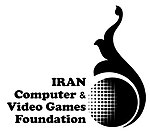This article has multiple issues. Please help improve it or discuss these issues on the talk page. (Learn how and when to remove these template messages)
|
 | |
| Formation | January 1, 2007 |
|---|---|
| Type | Nonprofit organization |
| Location | |
Area served | Iran |
Parent organization | Ministry of Culture and Islamic Guidance |
| Website | en |
The Iran Computer and Video Games Foundation (ICVGF), also known as the National Foundation for Computer Games (NFCG), is an Iranian nonprofit organization[dubious – discuss] established by the Ministry of Culture and Islamic Guidance to control and support the video game industry in Iran.[1]
Established in 2007, the ICVGF is responsible for publishing and releasing video games, supporting Iranian video game developers, teaching video game development, and monitoring the activities of LAN gaming centers in Iran.[2] The ICVGF is also responsible for banning foreign video games that are not compatible with Iran's political views, and filtering video game websites that do not meet governmental rules.[3][4][5][6][7][8][9]
- ^ Mark J. P. Wolf, Toru Iwatani (2015-05-22). Video Games Around the World. MIT Press. p. 277. ISBN 978-0262328494.
- ^ "Iran's National Foundation of Computer Games to Organize Game Centers – Herald Boy". www.heraldboy.com. Retrieved 2016-08-21.
- ^ "Iran plans to block websites offering "1979 Revolution"". 2016-04-17. Retrieved 2016-08-21.
- ^ "Acclaimed PC game banned in Iran due to "hostile intentions"". 2016-06-09. Retrieved 2016-08-21.
- ^ "Iran Bans Video Game Based On Revolution". Retrieved 2016-08-21.
- ^ Lewis, Danny. "Inside Iran's Budding Video Game Industry". Retrieved 2016-07-16.
- ^ Azali, MohammadReza (2016-02-21). "The First National Conference on Computer Games in Iran". Techrasa. Retrieved 2016-07-16.
- ^ "Iran's video-gaming industry poised for action – Africa M.E." 2016-04-02. Retrieved 2016-07-16.
- ^ Šisler, Vit (2013-01-01). "Video Game Development in the Middle East: Iran, the Arab World, and Beyond". In Huntemann, Nina B.; Aslinger, Ben (eds.). Gaming Globally. Critical Media Studies. Palgrave Macmillan US. pp. 251–271. doi:10.1057/9781137006332_18. ISBN 978-1-349-43501-2.
